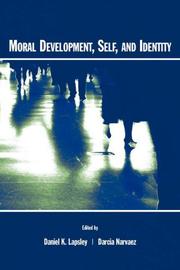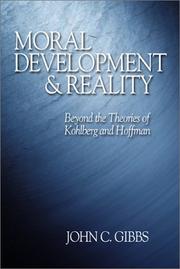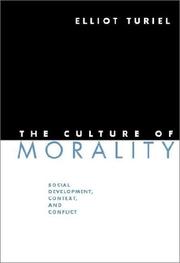| Listing 1 - 10 of 46 | << page >> |
Sort by
|
Book
ISBN: 1536152854 Year: 2019 Publisher: New York : Nova Science Publishers,
Abstract | Keywords | Export | Availability | Bookmark
 Loading...
Loading...Choose an application
- Reference Manager
- EndNote
- RefWorks (Direct export to RefWorks)
Moral development. --- Students --- Psychology.
Book
ISBN: 303137522X 3031375211 Year: 2024 Publisher: Cham : Springer Nature Switzerland : Imprint: Palgrave Macmillan,
Abstract | Keywords | Export | Availability | Bookmark
 Loading...
Loading...Choose an application
- Reference Manager
- EndNote
- RefWorks (Direct export to RefWorks)
This book has two main objectives. The first is to identify and adequately describe the phenomenon of empathy. This essentially means offering a strong, reasoned and accurate description of the phenomenon of empathy in order to capture the essence of the empathic phenomenon and clearly distinguish it from other similar emotional phenomena such as sympathy or compassion The second part focuses on the role that this phenomenon can play on the ethical-moral level. The question is whether empathy is necessary or at least important for morality, and if so, to what extent, in what way and for what reasons. This is an open access book.
Ethics. --- Philosophy of mind. --- Moral development. --- Moral Philosophy and Applied Ethics. --- Moral Psychology. --- Moral Development.

ISBN: 141061025X 9781410610256 0805842861 9780805842869 9780415650274 0415650275 9781135632335 1135632332 9781135632281 1135632286 9781135632328 1135632324 Year: 2004 Publisher: Mahwah, N.J. Lawrence Erlbaum Associates
Abstract | Keywords | Export | Availability | Bookmark
 Loading...
Loading...Choose an application
- Reference Manager
- EndNote
- RefWorks (Direct export to RefWorks)
This volume examines the psychological, social-relational, and cultural foundations of the most basic moral commitments. It begins by looking at the seminal writings of Augusto Blasi, whose writings on moral cognition, the development of self-identity, and moral personality have transformed the research agenda in moral psychology. This work is now the starting point of all discussion about the relationship between self and morality; the developmental grounding of the moral personality; and the moral integration of cognition, emotion, and behavior. Indeed, it is now widely believed that organiz
Moral development. --- Ethical development --- Child psychology --- Moral education --- Faith development
Book
ISBN: 1589016246 9781589016248 9781589016927 1589016920 Year: 2010 Publisher: Washington, D.C. Georgetown University Press
Abstract | Keywords | Export | Availability | Bookmark
 Loading...
Loading...Choose an application
- Reference Manager
- EndNote
- RefWorks (Direct export to RefWorks)
Childhood faces humanity with its own deepest and most perplexing questions. An ethics that truly includes the world's childhoods would transcend pre-modern traditional communities and modern rational autonomy with a postmodern aim of growing responsib
Ethics. --- Children. --- Moral development. --- Child welfare --- Moral and ethical aspects.
Book
Year: 2019 Publisher: Frontiers Media SA
Abstract | Keywords | Export | Availability | Bookmark
 Loading...
Loading...Choose an application
- Reference Manager
- EndNote
- RefWorks (Direct export to RefWorks)
This eBook is a collection of articles from a Frontiers Research Topic. Frontiers Research Topics are very popular trademarks of the Frontiers Journals Series: they are collections of at least ten articles, all centered on a particular subject. With their unique mix of varied contributions from Original Research to Review Articles, Frontiers Research Topics unify the most influential researchers, the latest key findings and historical advances in a hot research area! Find out more on how to host your own Frontiers Research Topic or contribute to one as an author by contacting the Frontiers Editorial Office: frontiersin.org/about/contact
moral cognition --- social cognition --- infancy --- early childhood --- moral development
Book
ISBN: 9780521895071 9780521719278 9780511627125 9780511595424 0511595425 1107201411 9786612393372 0511647328 1282393375 0511627122 0511651406 051159349X 0511592566 0521895073 0521719275 Year: 2009 Publisher: Cambridge Cambridge University Press
Abstract | Keywords | Export | Availability | Bookmark
 Loading...
Loading...Choose an application
- Reference Manager
- EndNote
- RefWorks (Direct export to RefWorks)
Moral notions are foundational questions that have commanded deep reflection since antiquity, reflection that psychological science cannot evade, because the moral formation of children is a central concern of parents, schools, and communities charged with educating the next generation. In this respect there are few domains of study more crucial than moral psychology and few topics of greater importance than the development of moral self-identity, of moral character, and of the moral personality. This edited volume features the expertise of pre-eminent scholars in moral personality, self, and identity, such as moral philosophers, personality theorists, developmental psychologists, moral personality researchers, social psychologists, and neuroscientists. It brings together cutting-edge work in moral psychology that illustrates an impressive diversity of theoretical perspectives and methodologies and simultaneously points the way toward promising integrative possibilities.
Moral development --- Judgment (Ethics) --- Psychology --- Philosophy --- Moral development. --- Moral judgment --- Ethics --- Ethical development --- Child psychology --- Moral education --- Faith development --- Philosophy. --- Health Sciences --- Psychiatry & Psychology

ISBN: 1452233608 1452264457 9781452264455 9781452233604 9780761923893 0761923896 Year: 2003 Publisher: Thousand Oaks, Calif. : SAGE,
Abstract | Keywords | Export | Availability | Bookmark
 Loading...
Loading...Choose an application
- Reference Manager
- EndNote
- RefWorks (Direct export to RefWorks)
The author explores moral development through the theories of Kohlberg & Hoffman, contributing to the broad dialogue on the question & nature of moral development & behaviour, as well as providing an introduction to these theories.
Moral development. --- Ethics, Evolutionary. --- Ethics, Naturalistic --- Evolutionary ethics --- Naturalistic ethics --- Ethics --- Ethical relativism --- Ethical development --- Child psychology --- Moral education --- Faith development --- Moral development

ISBN: 0262280701 0585332010 9780585332017 9780262140522 0262140527 9780262280709 Year: 1993 Publisher: Cambridge, Mass. MIT Press
Abstract | Keywords | Export | Availability | Bookmark
 Loading...
Loading...Choose an application
- Reference Manager
- EndNote
- RefWorks (Direct export to RefWorks)
Ethics --- Moral development. --- Ethics. --- Moral development --- Psychology and philosophy --- Philosophy --- Philosophy & Religion --- Deontology --- Ethics, Primitive --- Ethology --- Moral philosophy --- Morality --- Morals --- Philosophy, Moral --- Science, Moral --- Values --- Philosophy and psychology --- Ethical development --- Child psychology --- Moral education --- Faith development --- Psychological aspects.

ISBN: 110712476X 1280421452 0511613504 0511176430 0511041950 0511157266 0511304447 051104464X 9780511041952 9781280421457 9780511613500 9780511176432 9780521808330 0521808332 9780521721592 0521721598 9786610421459 6610421455 Year: 2002 Publisher: Cambridge Cambridge University Press
Abstract | Keywords | Export | Availability | Bookmark
 Loading...
Loading...Choose an application
- Reference Manager
- EndNote
- RefWorks (Direct export to RefWorks)
A thought-provoking examination of how explanations of social and moral development inform our understandings of morality and culture. A common theme in the latter part of the twentieth century has been to lament the moral state of American society and the decline of morality among youth. A sharp turn toward an extreme form of individualism and a lack of concern for community involvement and civic participation are often blamed for the moral crisis. Turiel challenges these views, drawing on a large body of research from developmental psychology, anthropology, sociology as well as social events, political movements, and journalistic accounts of social and political struggles. Turiel shows that generation after generation has lamented the decline of society and blamed young people. Using historical accounts, he persuasively argues that such characterizations of moral decline entail stereotyping, nostalgia for times past, and a failure to recognize the moral viewpoint of those who challenge traditions.
Social ethics. --- Moral development. --- Ethical development --- Child psychology --- Moral education --- Faith development --- Ethics --- Social problems --- Sociology --- Health Sciences --- Psychiatry & Psychology
Book
ISBN: 1472597885 128259060X 9786612590603 1441103368 9781441103369 9781441119308 1441119302 9780826491107 0826491103 9781472597885 9781441182746 1441182748 Year: 2010 Publisher: London New York Continuum
Abstract | Keywords | Export | Availability | Bookmark
 Loading...
Loading...Choose an application
- Reference Manager
- EndNote
- RefWorks (Direct export to RefWorks)
Aristotle's Nicomachean Ethics is devoted to the topic of human happiness. Yet, although Aristotle's conception of happiness is central to his whole philosophical project, there is much controversy surrounding it. Hope May offers a new interpretation of Aristotle's account of happiness - one which incorporates Aristotle's views about the biological development of human beings. May argues that the relationship amongst the moral virtues, the intellectual virtues, and happiness, is best understood through the lens of developmentalism. On this view, happiness emerges from the cultivation of a number of virtues that are developmentally related. May goes on to show how contemporary scholarship in psychology, ethical theory and legal philosophy signals a return to Aristotelian ethics. Specifically, May shows how a theory of motivation known as Self-Determination Theory and recent research on goal attainment have deep affinities to Aristotle's ethical theory. May argues that this recent work can ground a contemporary virtue theory that acknowledges the centrality of autonomy in a way that captures the fundamental tenets of Aristotle's ethics.
Moral development. --- Happiness. --- Gladness --- Emotions --- Cheerfulness --- Contentment --- Pleasure --- Well-being --- Ethical development --- Child psychology --- Moral education --- Faith development --- Aristotle. --- Aristotle
| Listing 1 - 10 of 46 | << page >> |
Sort by
|

 Search
Search Feedback
Feedback About UniCat
About UniCat  Help
Help News
News